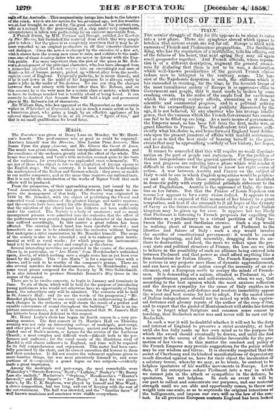A/1151f.
The Deeettore was given it Drury Lane on Monday, for Mr. Harri- son's benefit.- The performance with as good as could be expected: Harrison himself was the Manrieo, Miss 'Lenin Fyne Leahortr,7,Mies Susan Fyne tho gipsrArucena, and Mr. Glover the Caveat di Leona. The music was given entire, without interpolations or mutilation, and the excellence of the orchestra greatly aided the effect of the whole. The house was crammed, and Verdi's trite melodies, seemed quite to the taste a the audience, for everything was applauded most vehemently. We are not of those who object in Iota to the adaptation of foreign operas to the English stage. On the contrary, it is most desirable to naturalize the masterpieces of the Italian and German schools : they serve as models to our native composer-, and at the same time improve our nationaltaste. But it is not by the introduction of the works of Signor Verdi that such effects will be produced.
From the prospectus, of their approaching season, just issued by the Vocal Association, it appears that great efforts are being made to im- prove the management of that body. The Society was originated in 1856 by Mr. Benedict, with the object of performing the Choral and
concerted vocal compositions of the greatest foreign and native masters; aucl the concerts have been under his able direction. But it would seem that the selection of the choral band has hitherto not been sufficiently under his control. The Society is a body of amateurs ; and so many incompetent persons were admitted into the orchestra that the effect of the performances was greatly impaired and the character of the Associa- tion suffered accordingly. In this matter a great reform has been effected. The existing choral band has been carefully weeded ; and henceforth no one is to be admitted into the orchestra without having first undergone a strict examination by Mr. Benedict himself. The scope of the society is also to be extended ; and is to embrace great instru- mental as well as vocal works ; for which purpose the instrumental band is to be rendered as select and complete as the chorus.
Several interesting novelties are promised in the course of the season.
There is, in particular, an "Ave Maria" from Mendelssohn's unfinished opera, Lorely, of which nothing save a single scene has as yet been ever heard by the public. This "Ave Maria" is for a soprano voice with a chorus, and is said to be worthy of the composer's genius. There are also several marches for wind-instruments, also by Mendelasohn and some vocal pieces composed for the Society by M. Otto Goldsclimidt. It is also intended to produce Stemdale Bennett's May Queen in the comae of the season.
There are to be twelve concerts, to begin in January and terminate in June. To six of them, which will be held for the purpose of introducing young performers who would not otherwise have an opportunity of being heard, the subscribers only will be admitted. The concerts will be held in St. James's Hall: and (to use the words of the prospectus,) "Mr. Benedict pledges himself to use every exertion in endeavouring to effect such changes in the orchestra as will obtain the result of a perfect and equable conveyance of sound throughout the building." This is an im- portant announcement, as it will be remembered that St. James's Hall has hitherto been found deficient in this respect. Mr. Henry Leslie's choir has begun its fourth season in a very pro-
mising manner. The first concert at St. Martin's Hall on Thursday evening was not only an interesting mélange of madrigals, part-songs, and other pieces of secular vocal harmony, ancient and modern, but in- cluded one of Bach's motets, or hymns for the service of the Lutheran Church; a most complex and difficult work—difficult both to the per- formers and audience; for the vocal music of the illustrious rival of Handel is still almost unknown in England, and time will be required for its full comprehension and enjoyment. This motet had been care- fully practised by the choir, and its correct execution did honour to them and their conductor. It did not receive the vehement applause given to more familiar things, but was most attentively listened to, and some portions of it--especially a grand fugue on two subjects—evidently made a great impression.
Among the madrigals and part-songs, the most remarkable were
Walmisley's " Sweete floweres," Byrd's 'Lullaby," Morley's "My Bonny Lass she =flab," Macfarren's "Orpheus," Mendlessohn's "Hunter's larewell," and Henry Smart's "Ave Maria." A duet for two piano- forte's, by Mr. C. E. Stephens, was played by himself and Miss Ward; a clever composition, but too long, and out of keeping with the rest of Itte entertainment. The hall was crowded, and the "familiar faces" of well known musicians and amateurs were visible everywhere.


































 Previous page
Previous page